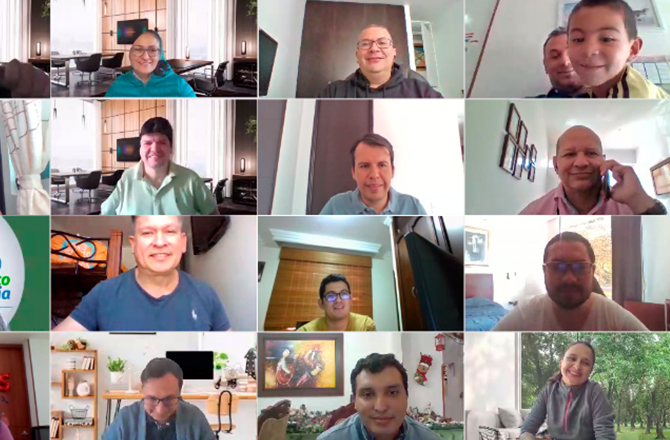

The development of human capital allows us to identify and strengthen the competencies of our leaders to achieve a talented work team, in addition to preparing them to face the challenges that our business demands, so that they have self-managed, competitive and result-oriented talent, and empower them, so that they can contribute to the development of others.
This way we guarantee that each collaborator, from his/her role, self-manages as a leader of his/her own development and aligns career expectations with the purpose of the organization, thus mobilizing change and innovation, knowledge management, skills strengthening, retention and growth; all this with the aim of fulfilling a shared purpose to achieve the goals.
In the Strategic Corporate plan, talent management leverages the C2 purpose "To have a talented and motivated work team focused on meeting objectives", clearly defining three specific goals:
Development of defined competencies.
Appropriation of culture for TGI's strategy.
TGI as one of the best companies to work for, according to the GPTW (Great Place to Work) measurement.
To fulfill this purpose, we will highlight two major achievements: first, we will review and update the Organizational competencies model as the basis of talent management, in line with the GEB Business Group and the objectives that our business requires.
Another fundamental achievement was reaching 100% of the HC impacted by the development process. All of our collaborators built their Individual Development Plan, in which they have carried out actions related to their functions and work projects, which has allowed them to develop the required skills.
Click on the image to enlarge.
Click on the image to enlarge.
Tgi, through its development process, seeks a performance management where we evaluate our employees not only for said performance, but also for their progress in the development process. This is how we evaluate the leaders of the organization through a 360 assessment, which allows to have a vision of the process in closing skills gaps. Likewise, we evaluate all collaborators in their processes through the evaluation of the direct report, which allows us to know the specific actions to ensure that the talent team has the required competencies in the organizational field.
| Percentage of employees whose performance and professional development is regularly evaluated, broken down by gender and professional category | % |
|---|---|
| Percentage of employees evaluated Senior Management | 83% |
| Percentage of employees evaluated Middle Management | 98% |
| Percentage of employees evaluated advisor | 100% |
| Percentage of employees evaluated professional | 96% |
| Percentage of employees evaluated support / support | 100% |
| Total percentage of employees evaluated | 98% |
At tgi, we worked in 2020 on the alignment of our attributes and values with the geb organizational skills model, to promote the mobility of our employees in the group.
Regarding the Individual Development Plan, we included the Leadership Plan, in order to assess the competencies and identify the potential against the required profiles, in accordance with the strategic goals and objectives of our company.
We identified the gaps to establish the individual development plans of our collaborators, which were executed using the 70/20/10 methodology to implement actions related to their daily activities, mentoring or coaching, and training.
(404-2) We implement training plans related to management and leadership skills for all levels of the organization, in order to strengthen the corporate competencies established in the model: passion for achievement, effective communication, collaborative work, self-development and others, and a mobilizer of change and innovation.
(404-1) We had an average of 149 hours of training per employee, 110 hours more than in 2019. This increase in training is due to the centralization of training in the Annual Training Plan, the implementation of the curriculum within the framework of the implementation of the operational model, in order to leverage knowledge management for comprehensiveness in the assets of the company, and the execution of the Soft Skills Development Plan to develop the Leadership and Technical Skills Plan in order to strengthen the continuity of the business and the operation. In addition, we integrated transversal training within the contingency due to the Covid-19 pandemic and measures such as work at home, which allowed the optimization of resources and the use of our staff's time. (See annexes)
We defined the methodology to implement the Succession Plan, which we used to identify the critical positions for the fulfillment of the strategy and the sustainability of the business. Likewise, we determined the key and potential talent to be the possible successors of said strategic positions, establishing the level of enlistment in order to train and train them in the short, medium and long term.
(401-2) We provide our collaborators with benefits that promote their well-being and balance of life. These include life insurance, medical insurance, marriage assistance, flexible hours, bonuses for results.
In the management of human talent we have the challenge of adopting standards and methods to lead the processes that require the strengthening of the skills of our collaborators.
Promote cultural transformation and the appropriation of behaviors to boost TGI's growth.
Continue with the maturity process of the organization's capacity for change, so that in different projects we can use a standard change management methodology and that the collaborators and instances of the organization use methods to lead and manage changes.
Implement the Succession Plan, establishing training for the different levels of preparation of key talent, in the short, medium and long term.
Leverage the corporate strategy from the cultural transformation, thus mobilizing change and innovation, to achieve effective leaders and the ideal talent that allow obtaining results in the short and medium term.
Strengthen the Annual Training Plan in line with the corporate strategy, specifically leveraging the pillars of expansion, innovation, change management and capabilities, as well as regulation and efficiency.